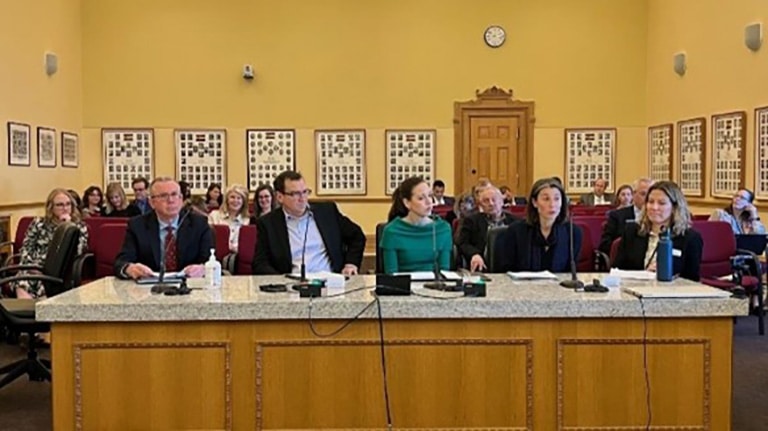People who want to support nonprofits helping those experiencing homelessness can now do so through ColoradoGives.org and benefit from state tax credits. Together with partners from the Colorado Nonprofit Association, STEP Denver, and La Puente, we celebrated the passage of Senate Bill 16 (SB24-016).
SB24-016 allows taxpayers to make charitable contributions through a qualified intermediary, like ColoradoGives.org. It authorizes a taxpayer to make a charitable contribution and claim a state income tax credit to a charitable organization through a qualified intermediary like Colorado Gives Foundation that forwards the contribution to receiving organization.

Colorado Gives Foundation is grateful to bill sponsors Senator Rachel Zenzinger, Senator Jim Smallwood, Representative Marc Snyder, and Representative Rick Taggart for their leadership in steering the bill through the process on behalf of Colorado’s nonprofits.
Did You Know?
Colorado has more than 34,000 nonprofits driving $62 billion in economic impact and providing 260,000 nonprofit jobs. “Colorado nonprofits are a source for good in our community well beyond their core mission areas,” said Paul Lhevine, president and CEO of the Colorado Nonprofit Association (CNA). “Allowing intermediary organizations like Colorado Gives Foundation to accept and pass through tax credit donations to the intended nonprofit will only strengthen giving and our state,” Lhevine added.
Colorado Gives Foundation created ColoradoGives.org in 2007 to make it easy for people to give online to support their favorite nonprofits. Now, the free platform hosts about 4,000 local nonprofits and drives donations throughout the year from over 100,000 donors. Each year, Colorado Gives Foundation also hosts Colorado Gives Day, a giving movement in Colorado that raised $54 million in 2023 to support local nonprofits.
Erica Thornley, vice president of product development for Colorado Gives Foundation, said that in 2023 the nonprofit community asked the Foundation for help because people who donated through intermediaries like Colorado Give Foundation and ColoradoGives.org weren’t able to qualify for or claim a homeless tax credit. Colorado Gives Foundation and other partners asked the state legislator to change the law.
An intermediary is a 501(c)(3) like Colorado Gives Foundation that collects charitable donations on behalf of another nonprofit. In our case, the Foundation collects donations through ColoradoGives.org and makes distributions back to the nonprofits receiving those donations. We offer nonprofits a cost-effective way to fundraise online with a free platform and processing fees that are lower than most nonprofits can get on their own.
“Colorado nonprofits rely upon the ColoradoGives.org platform to accept donations not just for Colorado Gives Day, but year-round,” said Thornley. “Disallowing the state tax credits to donors just because they gave through an intermediary puts the nonprofits in a tough position to deny those tax credits to their donors.”
In a recent survey by Colorado Gives Foundation, 60% of nonprofits said ColoradoGives.org is essential to meeting their fundraising goals. Each year, more than 100,000 donors use the platform to make giving easy, added Thornley. Many nonprofits in Colorado rely upon the giving platform for most or all of their fundraising.
Good For Everyone
“We use the ColoradoGives.org platform typically for Colorado Gives Day. Throughout the year, our donors can choose to give through the Colorado Gives platform or our website,” said Meghan Shay, executive director of STEP Denver, a nonprofit providing services that lead to long-term sobriety. She testified that they had a donor who wanted to give $30,000 online and STEP Denver recommended they use ColoradoGives.org because the low processing fees means more of the donation would go to their organization to support their mission of helping men overcome addiction through sobriety, work, accountability and community. STEP Denver is entirely supported through philanthropy.
Shay shared one example where two of their donors increased their giving because of the Colorado Homeless Contribution Income Tax Credit, one giving an additional $15,000 and another increasing his monthly contribution by $500 a month. Having ColoradoGives.org and the tax credit eligibility for their donors allows people to give more, she added.
“The Colorado Homeless Contribution Income Tax Credit was established to help Colorado’s nonprofit homeless service and housing providers by incentivizing civic engagement and private donations,” said Kristin Toombs, director of the Office of Homeless Initiatives for the State of Colorado’s Department of Local Affairs. In the first full tax year of 2023, there were 71 organizations across Colorado that participated in the Colorado Homeless Contribution Income Tax Credit program resulting in nearly 4,500 donors providing 7,300 donations totaling over $18 million dollars.
Benefitting All Colorado Communities
As Colorado continues to see more people entering homelessness, Toombs said the bill’s passage is coming at a particularly important time. Collectively across Colorado in 2023, homeless service providers helped over 8,800 people out of homelessness and into housing. During that same time, more than 9,100 people entered homelessness. “This bill will help empower our service providers to meet this important need,” said Toombs.
Across the state, “rural homeless is an unknown epidemic,” added Lance Cheslock, executive director of La Puente Home, a rural homeless service provider in Alamosa, Colorado offering street outreach programs, supportive housing, a shelter, and serving up to 300 people a year. He says the Colorado Homeless Contribution Income Tax Credit is essential in garnering local support and building local coalitions, and that intermediaries like Colorado Gives Foundation give them access to wide range of donors because donors can learn about their organization through ColoradoGives.org. The passage of SB 16 “will greatly help the other 85 homeless service providers that are participating in the Homeless Contribution tax Credit program,” he added.
